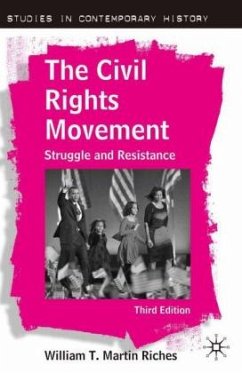Praise for the book when it was first published:
'William T. Martin Riches has written a book for undergraduates and general audiences that provides an excellent introduction to and review of the U.S. civil rights movement'
- Michael D. Cary , History: Review of New Books
The Civil Rights Movement in the United States struggled to create a nation. The Civil War ended de jure slavery but it needed the movement to dismantle laws designed to keep African Americans subordinated to white power. In this compelling introduction, William T. Martin Riches analyses the way African Americans developed a mass movement after World War II and overthrew state-enforced racial segregation despite fierce resistance from whites. Riches emphasises how the movement influenced others seeking justice in America, and evaluates the coalitions formed to preserve gains threatened by the rise of the New Right.
Thoroughly revised and updated in the light of the latest scholarship, the third edition of The Civil Rights Movement :
- sets the movement in its broader context
- stresses the changing role of black women, and their problems with the women's movement and black nationalism
- demonstrates the positive influence on some white southerners
- explores the key role played by the state and federal judiciaries
- assesses the administrations of George W. Bush
- examines the rise of Neo-Conservatism
- covers the presidential election campaign of 2008 and analyses Barack Obama's first months in office.
William T. Martin Riches was formerly Senior Lecturer and Convenor of American Studies at the University of Ulster, Jordanstown.
'William T. Martin Riches has written a book for undergraduates and general audiences that provides an excellent introduction to and review of the U.S. civil rights movement'
- Michael D. Cary , History: Review of New Books
The Civil Rights Movement in the United States struggled to create a nation. The Civil War ended de jure slavery but it needed the movement to dismantle laws designed to keep African Americans subordinated to white power. In this compelling introduction, William T. Martin Riches analyses the way African Americans developed a mass movement after World War II and overthrew state-enforced racial segregation despite fierce resistance from whites. Riches emphasises how the movement influenced others seeking justice in America, and evaluates the coalitions formed to preserve gains threatened by the rise of the New Right.
Thoroughly revised and updated in the light of the latest scholarship, the third edition of The Civil Rights Movement :
- sets the movement in its broader context
- stresses the changing role of black women, and their problems with the women's movement and black nationalism
- demonstrates the positive influence on some white southerners
- explores the key role played by the state and federal judiciaries
- assesses the administrations of George W. Bush
- examines the rise of Neo-Conservatism
- covers the presidential election campaign of 2008 and analyses Barack Obama's first months in office.
William T. Martin Riches was formerly Senior Lecturer and Convenor of American Studies at the University of Ulster, Jordanstown.

